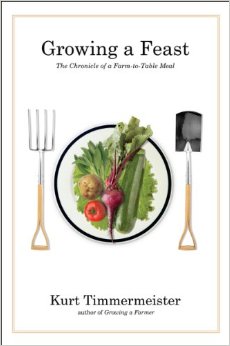Every year we look around for "Northwest-y" gifts to send across the country to a relative, or wrap for a local friend. Seven food-related books made the list this year; here's the first.
 Kurt Timmermeister's new book, "Growing a Feast," (W.W.Norton, $24.95) does the best job of telling the story of food itself.
Kurt Timmermeister's new book, "Growing a Feast," (W.W.Norton, $24.95) does the best job of telling the story of food itself.
His first book, after selling his Capitol Hill restaurant, Septieme, was called "Growing a Farmer." Not always "mouthwatering," either, with chapters on killing chickens and slaughtering pigs. Farming, he learns quickly, isn't just about deracinating vegetables or tugging at udders, it's about slitting throats, too, as his Facebook page shows this week. We may buy pork chops on Styrofoam trays wrapped in plastic, but Timmermeister knows better. "I feel that food is intrinsically good," he wrote in "Growing a Farmer." "Food is from the earth. It provides us with nutrition to live. It is the source of all life, it has the power to make us healthy."
Standing in opposition, symbolically and practically, are the public health authorities. "Their view," he writes, "is that food is intrinsically dangerous." Rather than fight the federal Food and Drug Administration and the Washington State Department of Agriculture, he stopped selling raw milk and raw butter.
How did Timmermeister get from Broadway to a self-sufficient, 12-acre farm, two thirds of it pastureland, on Vashon Island? The journey unfolds over two decades, as the urbanite becomes, first, a suburban homesteader, then a cautious gardener, before selling Septième and acquiring, in its stead, a Jersey cow named Dinah. His days become defined by the bookends of a farm, morning chores and evening chores. The four dozen birds and beasts (chickens, ducks, cows, sheep, pigs, dogs) on his property have to be milked, watered and fed. He has no farmhouse wife to help, no farmhouse kids, only a Mexican laborer (without whom, it's clear, the place would fall apart).
Craigslist is a huge help (for used tractor parts, for baby pig "weaners"). Two-day-old chicks come by US Mail. When it's time for the chickens to be dispatched, the wings get fed to the pigs, "smart, attentive, aggressive, stubborn and charming." Before Timmermeister brings himself to the painful business of killing a pig, he takes the reader through the agony and the joy of buying a gun. The dairy prospers as Kurtwood Farm, as it's now known, begins to produce a highly regarded, creamy cows milk cheese called Dinah.
And once a week, Timmermeister opens his kitchen table to a dozen visitors for a farmhouse dinner, a multicourse feast produced almost entirely from his own land (exceptions made for flour and salt). And yes, there's plenty of farmhouse butter.
It's on those farmhouse dinners that the new book, "Growing a Feast," opens. Overwhelmed by the success of his farmhouse cheese operation, he decides to give up the dinners but realizes he misses the excitement, the people, the camaraderie. (Not the picky eaters, not the drunks.) Instead, like Babette in the 1987 film (Babette's Feast) he decides to prepare a single grand harvest repast.
Timmermeister brings in a professional chef and spends a couple of days cooking, but then realizes that his meal really started two years earlier when a young female calf, Alice, was born in his barn. Most of the items on the menu contain the sweet cream butter that he churned by hand two years after her birth. "It begins when those first seeds are planted, the animals are born, the cucumbers picked ..."
He observes every detail, describes and explains, tells stories cinematically. From that first epiphany, the book is a countdown to the feast. And then it is time. Timmermeister may have spent his adult life in restaurants, "in service," as he puts it, but he remains nervous. He watches his chef roll out the dough for pizza; he watches the guests' cars come down the gravel driveway. The music changes from classic rock to a more appropriate selection. The 20 guests settle in and Timmermeister gives a welcoming speech. Soup is served, to be eaten with oversized German silver spoons. Antipasti next, including bits of cheese from Kurtwood Farms. Poached eggs over kale slathered with Bearnaise sauce. Chicken livers. Pasta, and so on, through dessert and coffee (from a roaster on Vashon). "There is a story to every part of the meal," Timmermeister concludes. "Not just last night's farm dinner, but every meal." It's a deeply satisfying book, well-told by a man of great talent and great humility.
This review appeared recently on Crosscut.com as part of a survey of Northwest food books for the holidays.
Leave a comment